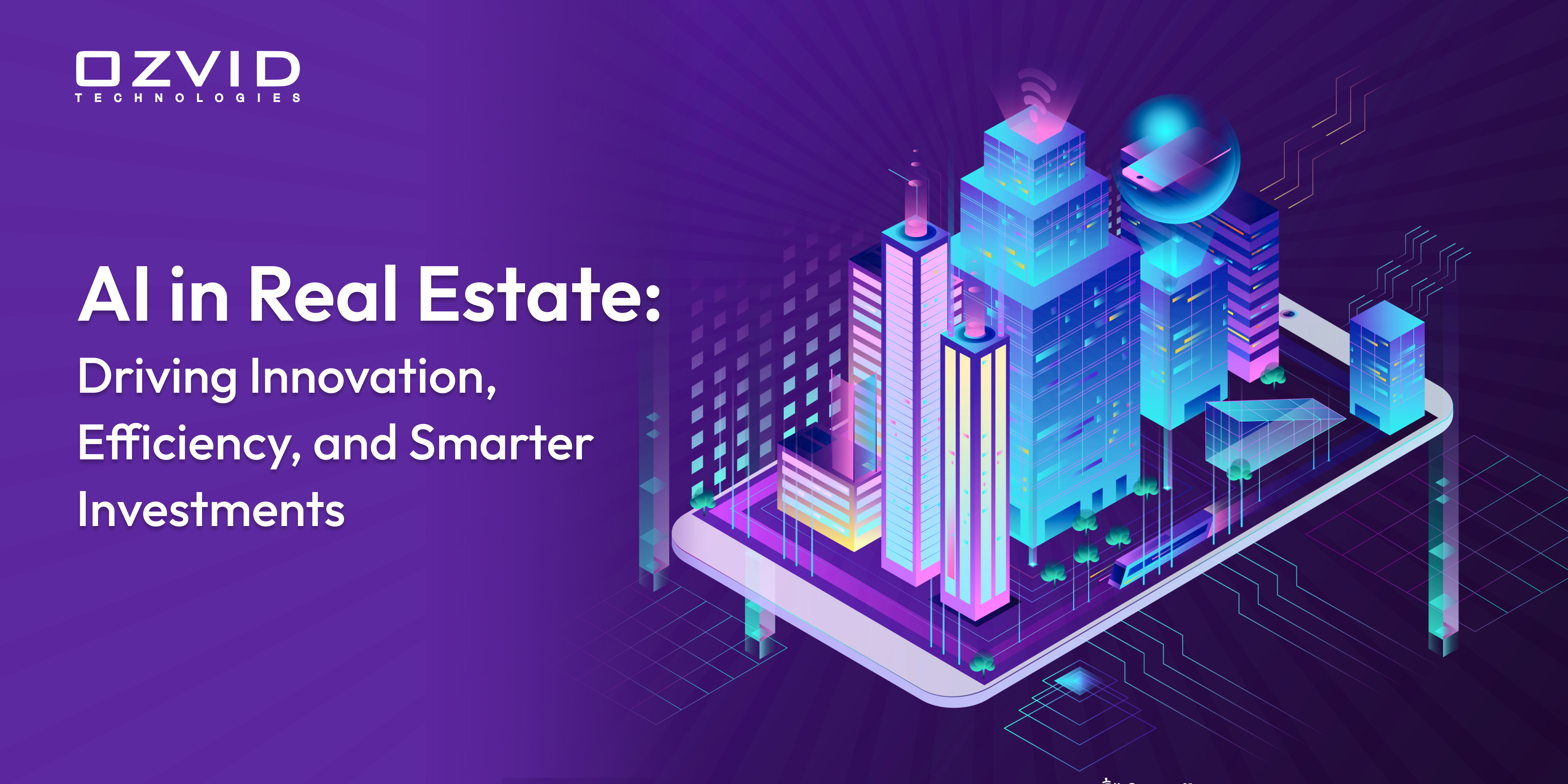- Apr 28, 2025
Share this post on:

Are you looking for smart real-estate solutions? Do you want to reshape the real estate market? Do you know that AI can change your perspective on how we look at a real-estate business?
The AI-powered real estate market is growing fast and is expected to reach nearly $988.59 billion by 2029, growing at a CAGR of 34.4%. This growth comes from a focus on protecting data, offering personalized services, and improving how companies communicate with their customers.
Key trends include making it easier for people to use real estate apps, using smart tools to guess property prices, helping people find homes faster, offering virtual tours, and automating property management tasks.
AI in real estate means using smart computer technology to improve different parts of the real estate business. It uses computer programs that can study a lot of information, learn from patterns, and make smart guesses or suggestions about buying and selling properties, managing buildings, helping customers, and understanding the market.
Key Takeaways
- AI automates tasks and personalizes experiences, making real estate faster and more efficient.
- AI models provide accurate property valuations and predict market trends using diverse data.
- Virtual tours, chatbots, and recommendations improve buyer engagement and convenience.
- Automation reduces errors and speeds up document and compliance processes.
- Developing AI solutions requires investment in data, models, integration, and maintenance.
Role of AI in the Real Estate Industry
Artificial Intelligence is changing the real estate business by helping them make better decisions and offer personalized experiences to their customers. Using AI, businesses can easily reach out to new properties based on what buyers choose and automate routine tasks including scheduling viewings and providing virtual tours.Overall, AI makes real estate faster, easier, and more personalized for everyone involved.
Data Collection:
AI systems gather information from many sources, like property listings, social media feedback, and others. They mix organized data, such as property prices and sizes, with unorganized data like customer reviews and pictures.This helps AI discover hidden patterns and market trends that people might miss.
Market Forecasting:
Traditional property valuation methods rely on comparing similar sales and manual appraisals, which can take a lot of time. AI-powered valuation models use smart technology to look at many factors at the same time, such as location, market demand, nearby developments, and the economy. This creates fast and accurate property values. AI keeps learning from new information and updates its predictions as the market changes. It can also predict future market trends and investment opportunities by studying past and current data.This helps investors and developers make better decisions, reduce risks, and increase profits.
Personalized Customer Experiences:
AI helps businesses by personalizing the property search and buying process. It looks at what buyers like, their past searches, and how they act. Recommendation systems suggest homes that fit each person’s style, budget, and needs, making it easier to find the right property. Chatbots and virtual assistants work 24/7 to answer questions, schedule visits, and guide buyers through the process with little help from humans.
Automation and Operational Efficiency:
AI automates repetitive and time-consuming tasks such as document verification, lease management, and compliance checks. For example, AI can detect inconsistencies in contracts or flag listings that violate housing regulations. This helps in reducing errors and speeds up transactions.
Fraud Detection and Compliance:
AI is evolving. With the rise of AI-generated images and content, fraud detection has become critical. AI-powered computer vision tools can easily tell you if the property photos are manipulated and misleading, protecting buyers and maintaining marketplace integrity.
Top AI Use Cases in Real Estate
AI's impact on real estate spans a broad spectrum of applications, each driving innovation and efficiency in unique ways.
1. Predictive Analytics: AI models analyze datasets to predict property prices and identify high-potential investment opportunities. Predictive analysis helps businesses optimize portfolios and developers plan projects with better financial outcomes.
2. Virtual Reality and Augmented Reality: AI combined with AR developers immersive virtual property tours and virtual staging. This allows customers to explore and customize homes remotely. This technology is valuable for international or remote buyers, saving time and improving engagement.
3. Automated Document Management: AI helps businesses automate the verification of leases, loan documents, and contracts by cross-referencing data points. This helps businesses detect potential fraud. However, Natural language processing (NLP) allows AI to generate, review, and manage legal documents while ensuring accuracy.
4. Smart Property Management: AI-powered real estate apps connect with smart devices to monitor building systems, use energy more efficiently, and predict when maintenance is needed. This helps reduce costs and keeps everything running smoothly, making users happier by preventing problems before they start.
5. Chatbots and Customer Engagement: AI chatbots are virtual helpers that quickly answer questions, book appointments, and find serious buyers. They help businesses give better customer service and make things easier for everyone.
6. Marketing Optimization and SEO: AI analysis help businesses search trends and user behavior to develop SEO-optimized property descriptions and targeted marketing campaigns. This increases online visibility and attracts qualified leads, increasing sales conversions.
7. Fraud Detection: AI tools detect manipulated images and false listings, ensuring data integrity. They also monitor compliance with housing laws, reducing legal risks for brokers.
Cost of Developing AI-Powered Real Estate Solutions
Developing AI-powered solutions for real estate involves several cost factors, which vary depending on the complexity, scope, and technology stack. Key cost components include:
Data Acquisition and Preparation:
Clean data is very important for AI to work well. Costs come from buying data, combining different data sources, and cleaning or labeling the data so it is correct. Real estate data can include property details, market trends, people’s info, photos, and legal papers.
Building AI Models:
Creating AI models needs experts in machine learning and data science. Costs depend on whether you build new models or use existing ones. Complex models for things like property pricing, recommendations, or fraud detection take more time and money.
Software Development and Integration:
Making apps or websites and connecting AI to real estate systems adds to the cost. This includes cloud storage, connecting other services, and making sure everything is secure.
Testing and Checking:
AI models need lots of testing to make sure they work well and give correct results. This means checking predictions, testing with users, and following rules. It requires a team to keep improving the system.
Maintenance and Updates:
AI systems need regular updates with new data, retraining models, and adding new features based on feedback and market changes. This is an ongoing cost.
Estimated Cost Range
Basic AI Solutions: For simple chatbots or property recommendation engines, costs can start from $50,000 to $100,000.
Advanced AI Platforms: Comprehensive systems with predictive analytics, virtual tours, automated document management, and IoT integration typically range from $200,000 to $500,000 or more.
Enterprise-Grade Solutions: Large-scale, fully integrated AI-powered real estate platforms with custom AI models, extensive data pipelines, and multi-channel interfaces can exceed $1 million.
Conclusion:
AI isn’t just a thing of the future anymore, it is our present and has become one of the most important part of how real estate works today. It helps businesses succeed by looking at the past data and can handle information easily, automate tasks, and make experiences more personal for buyers and sellers.
This changes the way people buy, sell, and take care of properties. As AI keeps getting better, real estate professionals will need to use it more and more to keep up and succeed in a fast-changing market.
OZVID Technologies is a leading AI-powered real estate app development company, renowned for developing the best app solutions for the businesses worldwide. Partner with us today and revolutionize real-estate business with us.
FAQ's
Q1: What is the role of AI in real estate?
AI helps real estate businesses make better decisions by analyzing large datasets, automating routine tasks, personalizing customer experiences, and improving operational efficiency. It enables faster property valuations, predictive market forecasting, virtual tours, and fraud detection, transforming the entire real estate process.
Q2: How does AI improve property valuation and market forecasting?
AI-powered models analyze multiple factors simultaneously, such as location, market demand, nearby developments, and economic indicators, to deliver fast, accurate property valuations. These models continuously learn from new data to update predictions and forecast future market trends, helping investors reduce risks and optimize returns.
Q3: What are common AI applications in real estate?
Key AI applications include predictive analytics for investment insights, virtual and augmented reality for immersive property tours, automated document management, smart property management via IoT, AI chatbots for customer engagement, marketing optimization, and fraud detection to ensure listing authenticity and compliance.
Q4: How does AI personalize the real estate buying experience?
AI analyzes buyers’ preferences, past searches, and behaviors to recommend properties tailored to individual styles, budgets, and needs. AI-powered chatbots and virtual assistants provide 24/7 support, schedule viewings, and guide buyers through the process, enhancing convenience and satisfaction.










